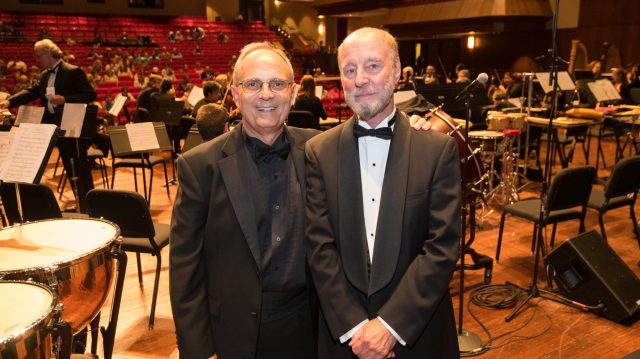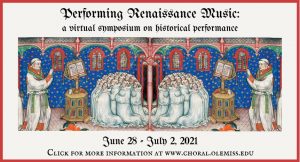
Donald Trott (left), UM director of choral activities, and Dennis Shrock spend time together before the ‘Leonard Bernstein at 100: A Musical Celebration’ performance at the Gertrude C. Ford Center for the Performing Arts in 2018. Shrock and Trott have worked together several times since they first became acquainted in 1975, when Trott was a student at Westminster Choir College in Princeton, New Jersey. Photo by Kevin Bain/Ole Miss Digital Imaging Services
OXFORD, Miss. – When art lovers consider the visual art of the Renaissance, they may think of elevated expression, vibrant color, innovation and perspective. When they consider the music of the period, however, it can be a very different story, noted choral director and scholar Dennis Shrock says.
“The Renaissance music we hear today, composed at the same time as the painting, sculptures and imagery, is flat, dull and restrained,” Shrock said. “It is as if the music has been covered up by centuries of dust and grime that conceal its vibrant colors.”
But taking the time to understand how the music was intended to be played and sung will bring new life to performances and encourage conductors to revisit Renaissance repertoire, both familiar and new, said Donald Trott, director of choral activities at the University of Mississippi.
“Performing Renaissance Music: A Virtual Symposium on Historical Performance” is an upcoming online symposium presented by the university’s Department of Music, hosted by Trott and featuring Shrock, that will dive into the practical aspects of performing Renaissance music, taking direction from historical sources from that same period.
“By performing the music in new, historically-informed ways, we are able to clean off the dirt and grime of past misunderstandings and restore the music to its natural beauty,” Shrock said. “And, as a result, we can better appreciate the music and create a desire to perform more of it with greater frequency.”
The symposium originally was planned as an on-campus event in the summer of 2020. Deciding to make the proceedings virtual was not just an accommodation to the pandemic; it provided an opportunity to make the material much more broadly available, Trott said.
“A student or teacher anywhere can access these videos, pause and rewind to better study the musical samples and come away with a very strong understanding of how to work with Renaissance music with a higher level of confidence,” he said.
Symposium content will be released as one video per evening during the week of June 28 on the UM Choirs’ YouTube channel and will remain there for anyone to enjoy, free of charge.
 Although the content will be practical enough to be of great value to a choral director or singer, it also will be fascinating to anyone interested in music or in other Renaissance art forms, Trott said.
Although the content will be practical enough to be of great value to a choral director or singer, it also will be fascinating to anyone interested in music or in other Renaissance art forms, Trott said.
“It’s an accessible insider’s look into the music of this period, but also into how the music is made,” he said. “The music used throughout the videos is beautiful and will be interesting to anyone who likes the Renaissance – or music in general.”
A robust tradition of performer-driven explorations of early music exists, often conducted in collaboration with musicologists who specialize in the time period, said musicologist Thomas Peattie, a UM associate professor of music.
“Historically-informed early-music performance grew in the second half of the 20th century and helps both performers and audiences engage with the music on a more substantial level,” he said.
The symposium will be an important choral resource and an especially meaningful experience for Ole Miss choral students, many of whom read Shrock’s recent book on the topic for class during the 2020-21 academic year. The book is also entitled “Performing Renaissance Music.”
The symposium comprises lectures in which Shrock explores five essential aspects of performing Renaissance music; each lecture also features professional singers performing pieces that illustrate and illumine Shrock’s points.
“We have the ability to experience the music as we do the paintings of Leonardo da Vinci and the sculptures of Michelangelo, as well as all of the other expressive imagery of the time,” Shrock said. But to make performances “comparable to, and as exciting as, the artworks,” musicians need to consider five areas of performance: sources and forces, sound and pitch, meter and tempo, phrasing and text underlay, and ornamentation and expression, he said.
A noted choral scholar and author of several books on historic performance and repertoire, Shrock has held faculty positions at Boston University, Westminster Choir College, University of Oklahoma and Texas Christian University. He has had residencies at numerous universities and frequently serves as a guest conductor and lecturer.
He most recently appeared at Ole Miss in the fall of 2018, when he served as a guest conductor and lecturer as part of events celebrating what would have been the 100th birthday of renowned composer and conductor Leonard Bernstein.
The introductory video to the symposium is already available on YouTube. In it, Shrock gives an overview of his approach to performing Renaissance music and illustrates with musical samples.
Keep up with the Ole Miss Choral Symposium on Facebook and fill out this interest form to receive updates and broadcast reminders.